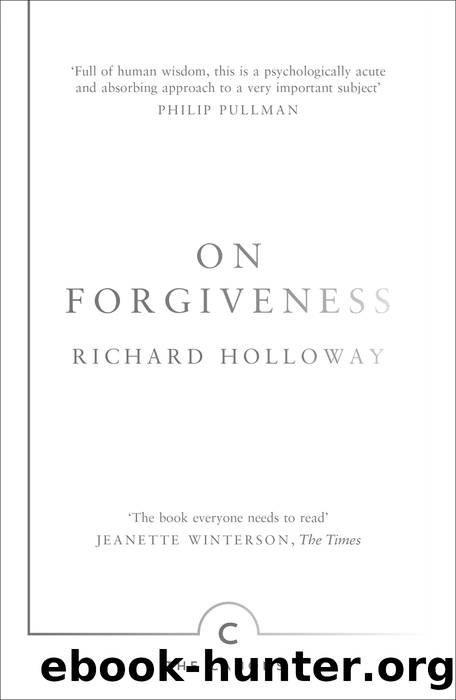On Forgiveness by Richard Holloway

Author:Richard Holloway [Richard Holloway]
Language: eng
Format: epub
ISBN: 9781847677143
Publisher: Canongate Books
Published: 2009-01-15T00:00:00+00:00
The traditional way to read the parable of the prodigal son is to interpret it as an example of conditional forgiveness at work, through the process of repentance, leading to confession, followed by re-instatement. The focus is usually on the moment of self-realisation when the wayward son âcame to himselfâ and decided to go to his father and confess the sin he had committed. This moment of repentance, which means a radical change of mind, is the act that triggers forgiveness. Behind it is the theory that you cannot receive or make active use of forgiveness until you acknowledge that you need it. A moment spent reflecting on the psychological phenomenon known as âdenialâ seems to be relevant here. As long as we go on denying that we have a problem with something that is actually disabling us we are not in a position to deal with it. The purpose of coming to ourselves and admitting our true condition is so that we can start dealing with the difficulty and stop running away from it. Repentance followed by confession is the sequence that opens us to the changing power of forgiveness. I, as the victim, may already have forgiven you and moved on, but unless you can admit to the trespass the value of my forgiveness will lie there like an uncashed cheque.
That is still the most usual way to read this parable and the theory of forgiveness that has been based upon it. Repentance is change of heart and mind. It acknowledges the reality of what we have done, the kind of persons we are. It is a radical honesty that comes as an enormous relief to the troubled spirit; it is the moment when we stop running from the truth about ourselves. It is normally the prelude to a new kind of self-management that begins by confessing and trying to repair the damage we have done to others in the past. Like the prodigal son, we come to ourselves and go to the one we have hurt and confess our fault. But there is another, more radical, reading of this parable that may provide a clue to understanding my epigraph from Derrida. I want to add to that conundrum a further paradox that reverses the normal order of repentance followed by confession: there is a kind of forgiveness that is so absolute and unconditional that it can create repentance in the heart that has been hardened against change. Although the path of conditional forgiveness â the path of repentance, confession and re-instatement â is the one we follow most commonly in our daily relations with each other, I want in the next chapter to explore the experience of unconditional forgiveness, a forgiveness so total and so generous that it can sometimes redirect the path of history.
Download
This site does not store any files on its server. We only index and link to content provided by other sites. Please contact the content providers to delete copyright contents if any and email us, we'll remove relevant links or contents immediately.
Zero to IPO: Over $1 Trillion of Actionable Advice from the World's Most Successful Entrepreneurs by Frederic Kerrest(4567)
Machine Learning at Scale with H2O by Gregory Keys | David Whiting(4312)
Never by Ken Follett(3954)
Harry Potter and the Goblet Of Fire by J.K. Rowling(3856)
Ogilvy on Advertising by David Ogilvy(3621)
Shadow of Night by Deborah Harkness(3367)
The Man Who Died Twice by Richard Osman(3077)
Book of Life by Deborah Harkness(2938)
The Tipping Point by Malcolm Gladwell(2920)
Will by Will Smith(2919)
Purple Hibiscus by Chimamanda Ngozi Adichie(2853)
0041152001443424520 .pdf by Unknown(2845)
My Brilliant Friend by Elena Ferrante(2829)
How Proust Can Change Your Life by Alain De Botton(2812)
How to Pay Zero Taxes, 2018 by Jeff A. Schnepper(2654)
Hooked: A Dark, Contemporary Romance (Never After Series) by Emily McIntire(2553)
Rationality by Steven Pinker(2363)
Can't Hurt Me: Master Your Mind and Defy the Odds - Clean Edition by David Goggins(2339)
Borders by unknow(2313)
